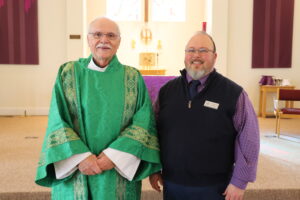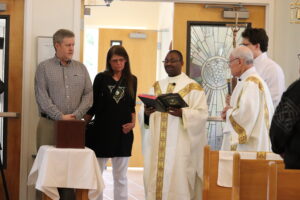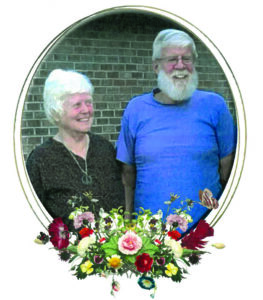Good Shepherd funeral reminds of loss, survival
By Gabrielle Nolan
The city of Newport continues to recover and rebuild six months after Hurricane Helene flooded its downtown and the surrounding areas on Sept. 27, causing destruction in its muddy-watered path.
Not only were numerous homes and businesses negatively impacted within Cocke County, but local citizens lost their lives. Others who survived the dangerous floodwaters are still seeking new housing and are in need of help to acquire basic necessities.
Deacon David Duhamel, executive director of Catholic Charities of East Tennessee (CCETN), recalled his organization’s response to the Newport community, working closely with the Church of the Good Shepherd and its parochial administrator, Father Pontian Kiyimba, AJ.
“Most damage happened in and around the main old city part of town,” Deacon Duhamel said. “CCETN provided emergency housing and short-term shelters via hotels and Airbnbs.”
Several citizens requested services and assistance from CCETN, so the Diocese of Knoxville social services agency’s team provided disaster case management and continued to support and coordinate relief and long-term recovery efforts.
CCETN also brought in loads of water, food, baby items, and other necessary supplies.
Church of the Good Shepherd became a community distribution point, where the Cathedral of the Most Sacred Heart of Jesus, among others, would send shipments of collected supplies.
“[Father Pontian] prescribed Scott Mulligan, a leader in the St. Vincent de Paul group, to be our main point of contact. He and I got together early on and supported getting relief supplies into Newport. Scott was instrumental in helping his parish and community. While coordinating relief operations, he worked with the local incident command staff, recruited a local veterans group to provide labor and assistance, all the while working full time in the Sevier County school system,” Deacon Duhamel explained.

Deacon Otto Preske, left, and Scott Mulligan, ministries coordinator for Church of the Good Shepherd in Newport, helped lead disaster-relief efforts at Good Shepherd, which became a center for relief donations and distribution following Hurricane Helene flooding. (Photo Gabrielle Nolan)
A slow road to recovery
Mr. Mulligan serves as the ministries coordinator for Church of the Good Shepherd and is a liaison to the community at large.
He said the aftermath of Hurricane Helene is still affecting Newport.
“We’re still in the rebuilding phase,” Mr. Mulligan shared. “I got a text last night of a family that is still living in a camper, and now we’re having to go and tarp the camper because the camper started to leak. It was a donated camper. So, we still are dealing with this every day here in Newport.”
“Most of downtown flooded, and so we lost a whole lot of small businesses,” he continued. “A lot of the larger companies, like bigger banks, were able to keep moving forward, but you drive through downtown Newport, and you can still see today the condemned signs on buildings, and you can still see buildings that were once there. We went to this ice cream shop, and it’s not there anymore. They weren’t able to recover, to rebuild.”
Mr. Mulligan believes the town will feel the impact of Hurricane Helene for many years to come.
“We don’t have enough housing for people that have lost their housing, so people are in tents, and people are in temporary housing, people are in campers, and people are living with friends because there’s just not enough housing here in Newport to house everyone,” he explained.
Mr. Mulligan also works with the long-term recovery committee in Cocke County to assist people with “unmet needs.”
“The long-term recovery committee calls St. Vincent de Paul and says, ‘Hey, I’ve got this family that needs a washing machine or needs windows,’ and we try to help find the funding to do that. The St. Vincent de Paul recently just got a grant that we are funding a construction manager to help the long-term recovery committee do some of this rebuilding with volunteers,” he remarked.

Floodwaters surround buildings in Newport on Sept. 27 in the aftermath of Hurricane Helene. Cocke County was inundated with floodwaters from the Pigeon, Nolichucky, and French Broad rivers that overflowed their banks. (Photo OSV News/Curtis Hance/H&H Vapors via Reuters)
The Federal Emergency Management Agency (FEMA) has denied some local residents’ claims, and Mr. Mulligan said the church is working to assist those individuals as well.
Mr. Mulligan noted that a group of pastors in Newport has joined together to provide support to the community, and there are also secular organizations that are pitching in, such as the Helen Ross McNabb Center.
For those interested in supporting Newport in its recovery efforts, Mr. Mulligan recommends either donating directly to CCETN or the Cocke County long-term recovery group.
The two priests at Church of the Good Shepherd, Father Kiyimba and parochial vicar Father Emmanuel Massawe, AJ, have been fielding phone calls from local residents experiencing grief and needing spiritual support, Mr. Mulligan shared.
“But I can speak from St. Vincent de Paul that our number of calls a week have drastically increased since Helene,” he said. “We went from seeing about eight to 10 families a week to we can see 20 to 40 families a week who need help, and we’re just trying to do the best we can. Our St. Vincent de Paul people pray with them—even if we can’t help their physical needs, we always offer prayer and offer to sit and pray and talk with them to see what we can do, or see if we can refer them somewhere else.”
Deacon Otto Preske, a retired deacon who serves at Church of the Good Shepherd, recalled that when the parish had the disaster-relief distribution center last fall it was “amazing how we were supported by people from who knows where.”
One memory that sticks out to the deacon is when a large U-Haul truck arrived at the parish from Pikeville, Ky., and it took six men about three hours to unload all of the supplies it contained.
He said the parish’s gathering space in the church basement was full from everybody “pitching in helping.”
“I have a shop in Gatlinburg and met people from as far away as Michigan who were bringing stuff to Newport. It’s pretty amazing. And we took the excess of what we had up to Chimney Rock and Lake Lure (in North Carolina). When we closed our food bank down, the last part of the convoy took food up to Lake Lure as those people up there got hit hard,” Deacon Preske said.
Deacon Preske emphasized another way Hurricane Helene impacted the parish community at Church of the Good Shepherd: the death of two parishioners.
‘God’s time is not our time’
Mike Obrist, 82, and his wife, Jean Marie, 80, were caught in the floodwaters in their vehicles at their family farm of nearly 40 years.
Their daughter, Maureen Obrist, lived with them and was present for the horrific flooding of their 60-acre property, which is located one mile from the Nolichucky River.
“It was the middle of the night,” Ms. Obrist said. “It was pitch dark, and we got a call from a neighbor saying get out, the water is flooding and is coming. And they (her parents) didn’t really believe it was going to get to the house because it never had. And they started hearing water coming into the basement. So, we gathered up the animals and we went out, and the carport was fairly dry, so we thought we could get out. I backed the Outback down the driveway with me, my mother, and the dogs. And a wall of water came through, and it sucked the car (into the water), and the car started floating.”
Ms. Obrist’s driver-side window happened to be down, so she crawled out to go for help.
“I was going to go for help and promptly went under the water,” she recounted. “I almost died, couldn’t get up. It was racing, and it was full of stuff; it was muddy, and it was covered in diesel fuel. I lost my shoes, and I was hanging on to the car trying to get around to the other side to go get help, and I was fighting to swim to the house. And when I got up to the house, I could stand up, and it was up to my waist, and I was trying to walk. And my father was in the truck, and he came to me and rolled the passenger window down and said, ‘What are you doing?’ And I said, ‘I’m drowning, don’t go.’ Zoom, down the driveway he went to get his wife.”
With her father’s truck shutting off in the water and his driver-side window down, Ms. Obrist entered the house and called 911 for help—until she heard her father calling her name.
“I hung the phone up and waded out to the back, and there was dead silence. Couldn’t get an answer. And I knew they were gone,” Ms. Obrist shared. “And one of the dogs that was in my dad’s truck must have got out the window, he swam up to the house. He and I were the only two that made it out that night.”
Ms. Obrist waited on the front porch for swift-water rescue to arrive, which did as the water was about to go over her head.
“They had to come through the tree tops with their airboat, and it was pitch dark,” she remembered. “That water was full of debris. … They pulled me up into this boat, it was like an inflated boat, and they pulled me up in there, and it was freezing cold and wet. I had diesel fuel and mud all over me, no shoes, and only shorts and a T-shirt. There was no noise from around the house, and it was too dangerous around there, the current was too much. So, they turned and left and took me to rescue. And somebody there offered me her shoes, and they were too small, but I had to wear them. I had nothing else.”
After staying at the rescue shelter for a couple of days, the water eventually was shut off, and Ms. Obrist was moved to a different rescue shelter in Newport. Because she has a muscular disease, she had to visit the emergency room before she could stay at the shelter.
“By the time they let me in, somebody had gotten in touch with my brother in Nashville, and just as they were shutting everything down for the night, my brother showed up and took me to a hotel,” she said.
Mark Obrist, Maureen’s younger brother, drove from his home in Gallatin to help his sister in Newport after learning the devastating news about their parents and the family farm.
“I was at work when the storm hit there, so it was daytime,” he recalled. “And it wasn’t that bad. I mean it was rainfall, but we’ve had worse. And so, when I got home, I called and made sure everything was OK there. It was Friday night, and I called. ‘(They said) Hey, everything’s great; we’re getting ready to go to bed. Everything’s fine; there’s no problem. The creek didn’t even really come up; the storm’s gone by. There’s no issues.’ And so, I thought everything was fine.”
“I got up the next morning, and I was just running errands because it’s a weekend, and I get a call from the sheriff’s department saying, ‘Hey, the farm flooded and your parents are dead and your sister’s in the hospital. I mean, sorry to tell you this but there’s no other way other than the phone. We’ve been trying to get a-hold of you.’ So, the chaplain got a-hold of me, and I just packed up and started going, and it was like I didn’t believe it at first. … I talked to them eight hours ago, 12 hours ago,” he continued.
Arriving close to midnight, Mr. Obrist picked up his sister from the shelter, and they were able to secure hotel rooms. The next morning, they drove out to the farm and began to figure out their next steps.
“We started going through the house, and it was just mud and dirt and nastiness,” he shared. “You want to save stuff, but you can’t because it’s moldy or—even though I can clean it up, it’s ruined, it’s done. The house is ruined, and I had to face the reality of even though the house is still standing, looks OK, it’s dusty from the outside, you can still see the water line, but the house is gone. It’s gone permanently. The barns were destroyed, all the farm equipment was underwater. Can you clean it up? Sure. Is it going to work? Who knows? Machinery that has been flooded? The cars were destroyed, everything.”
The house was a total loss, with total damage to the property equivalent to $1 million. Ms. Obrist noted that after hours of working with FEMA, they were given nearly $60,000 and paid for two months of her rent in temporary housing.

Mark Obrist, left, and Maureen Obrist stand with the cremains of their parents, Jean Marie and Michael Edward Obrist, as the funeral Mass begins on March 29 at Church of the Good Shepherd in Newport. The Obrists were killed in the flooding from Hurricane Helene that struck East Tennessee in September. Father Emmanuel Massawe, AJ, gives a prayer and blessing, and is assisted by Deacon Otto Preske. (Photo Gabrielle Nolan)
The Obrist children remember the fond memories of their parents, who seemed to live a life of faith, adventure, and hard work.
“Upstate New York is where they were both born; that’s where my father was in seminary to become a priest. And my mother was becoming a nun, and they were both down to the very last step when they met each other, and so they left to get married. They moved from New York to Alaska when I was a toddler and my brother was an infant, just to homestead,” Ms. Obrist shared.
While in Alaska, Jean Marie Obrist was a chief accountant for a bureau, while Mike Obrist was a tax assessor. At night, they ran a janitorial business. The couple was able to retire in their early 40s and looked to relocate to the lower 48 states.
“They took a map of the lower 48 and they crossed off where they didn’t want to be, and then the places that were left they started visiting. And Kentucky was the first place, and a Realtor took my father across the state line into Tennessee, and he didn’t realize he was in Tennessee, and he saw that farm and bought it right then. And my mother trusted him,” Ms. Obrist said.
The homesteading couple named their family farm Innisfree, after the poem by William Butler Yeats, “The Lake Isle of Innisfree.”
“That was their place, and that was their life. It’s what they wanted, and they wanted to be there together. They wanted to be there when they died, and that’s where they were,” Ms. Obrist said.
On their many acres, Mr. and Mrs. Obrist grew gardens, orchards, and berry patches. They raised horses, chickens, and cattle. Because of their experience in Alaska, they knew how to butcher their own meat. Even the house ran on solar energy, so the couple tried to be as self-sufficient as possible on their homestead.
Ms. Obrist said they enjoyed reading and bird-watching, and they were musical people who could sing and play instruments.
“They did singing for the church,” she said. “My mother worked for the diocese in Greeneville for a while, and she worked with Father Jim Harvey for a while. Father Charlie Burton, who she worked with in Greeneville.”
Ms. Obrist shared that every year her father would sing the Exsultet at the Easter Vigil Mass at Church of the Good Shepherd.
“They asked him every year to sing the Exsultet, which is a capella and it’s 12 minutes. It’s not easy. But they really loved the way he did it,” she said.
A funeral Mass for the Obrists was held at Church of the Good Shepherd on March 29—a date of significance to the family.
It would have been Mike and Jean Marie’s 55th wedding anniversary.
“I read in the obituary that they were married for 54 years, and they were always together,” said Father Massawe. “They were together for 54 years, and they died together.”
Father Massawe, who celebrated the funeral Mass, gave his condolences to the Obrist children and their relatives.
“Dear friends, when we reflect on death, death always seems awful, not fair. Tragic. And especially when it takes away the life of our loved ones. And most of the time we ask this one particular question: why? Why me at this time? Why has it befallen in our family? Why my dad? Why my mom? This question I believe none of us may have answers to. It’s a mystery. And yet sometime it is a reality to us all,” Father Massawe said.
“As we gather here this time to celebrate the life of Mike and Jean Marie, they remind us of this reality: God’s time is not our time. We have lost wonderful friends, but we do not grieve without hope because we know that Jesus Christ is the resurrection and the life. And we believe in Him. We know that He suffered. He died and rose to new life so that Mike and Jean Marie may have eternal life. And this is our faith, and this is what the Scripture readings that we had proclaimed to us invite us to reflect upon: to have hope, courage, and to trust in the Lord Our Father and His Son, Jesus,” Father Massawe said, concluding his homily.


